Road Transport Expo 2025: T&BB’s truck body and trailer report
By Bradley Osborne - 31st July 2025
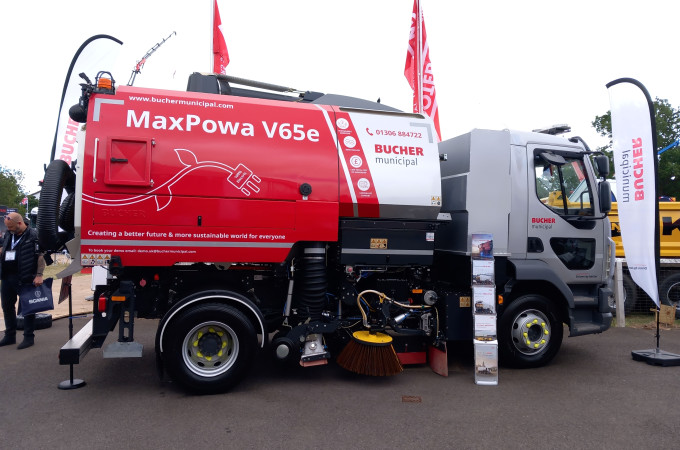
The MaxPowa V65e from Bucher Municipal
UK – Now in its fourth edition, the Road Transport Expo has grown exponentially since it began in 2022. I attended the inaugural show at the National Agricultural and Exhibition Centre in Stoneleigh, UK and missed the following two. Returning for the 2025 edition, the difference from the first show is night and day, with many more exhibitors and hundreds of trucks, vans, and trailers on display. For those reporting on the truck body and trailer industry in Britain, the expo has become indispensable: the companies featured in the report below represent just more than half of the truck body and trailer manufacturers who exhibited at the show.
The name “Road Transport” can be misleading: not all of the vehicles on display in Stoneleigh were made for transportation. A good example of the exception was the ‘V65e’, a street sweeper truck developed by Swiss manufacturer Bucher Municipal AG. With a dedicated 200-kWh battery pack, the street sweeper body can run continuously for five to six hours before needing to be plugged in to recharge. The V65e has been available for the past few years and is made domestically, at the manufacturer’s factory in Dorking. UK sales representatives told T&BB that, only a couple of months ago, Bucher acquired more land to build an extension to the current facility, with the aim of reducing lead times and improving the sustainability of its operations. Currently, the Dorking site produces around 1,000 bodies a year, of which 40% are exported. The bodies are mounted on chassis produced on the continent and shipped to England.
A show like RTX is a great opportunity to see some of the more weird and wonderful creations that come out of trailer workshops in Britain. The strangest and most impressive of them all was on the stand of King Vehicle Engineering Ltd, a large step-frame trailer designed for the safe transport of nuclear waste. This 60-tonne, five-axled flask transporter was developed to order to meet the very exacting requirements of the nuclear industry: Dominik Sanders, who is director of the trailer business, told T&BB that King excels in “highly customised and engineered builds” of this kind.
However, the company also produces large numbers of standardised trailers for conventional applications, including beavertails and “sloper” trailers for carrying heavy machinery. King’s main seller is the ‘GTS 44’ model, a step-frame low loader: around one hundred of these were built last year, of which twenty were supplied to the British military. SAF and Gigant remain the company’s favourite choices for trailer running gear.
In 2016, the King group of companies was acquired by the Martin Group, a provider of utility and transport engineering services. The Martin Group had been a major customer of King prior to the acquisition, and the relationship continues: at Stoneleigh, King debuted a roll-on, roll-off hook loader which was commissioned by its parent. According Sanders, King wants people to know that it is not only a manufacturer of trailers but a “skilled engineering company” with a broad range of fabrication capabilities.
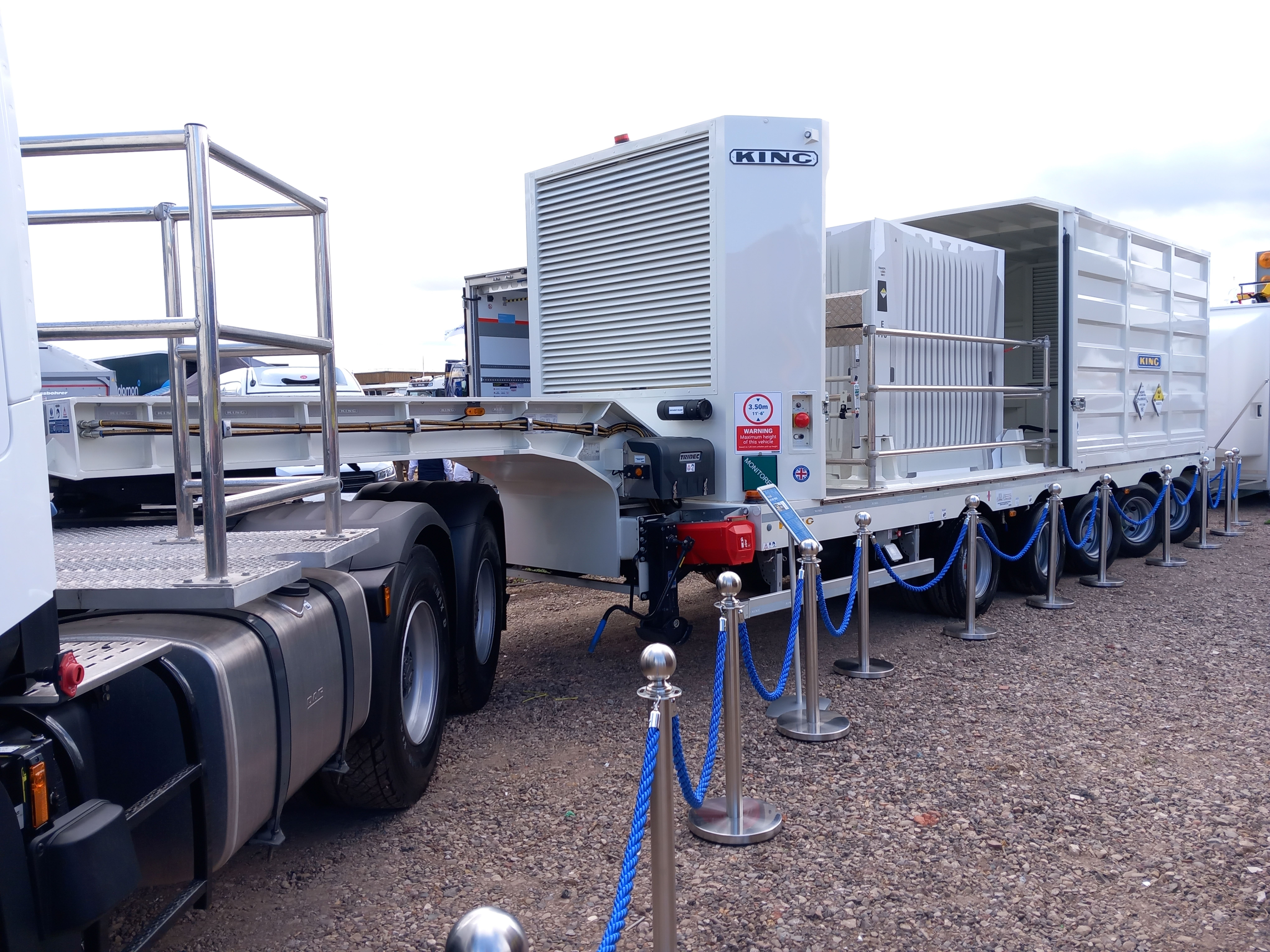
Nuclear flask transporter from King Trailers
Another very specialised segment within the truck body and van conversion world is the recovery vehicle. Examples of this type were shown by AMS Recovery Trucks Ltd of Wisbech, which builds between two and three hundred truck bodies, service vans, and drawbar trailers every year. According to sales director Josh Lockey, the company’s key selling point is its short lead times: as little as one to two weeks for its more standardised offerings. The company goes in for bespoke vehicle production far less than its peers in the recovery segment.
Double decks and large-volume trailer manufacturing
Double decks, which take advantage of permissive British regulations on trailer height, are a specialty of the domestic market. I saw a superlative example of the type from Don-Bur, which presented a double-deck trailer with a lifting deck. The company produces between 750 and 1,000 double decks every year. Richard Owens, technical support specialist and marketing manager for Don-Bur, showed off the trailer’s safety mechanisms, such as the “suspension safe” system which verbally alerts the operator if the trailer is above the safe ride-height threshold. Owens told T&BB it is not unusual for drivers to forget to lower the trailer’s air suspension, which in the worst cases can lead to bridge strikes. Don-Bur’s “safety suite” also includes a monitoring system for the electronic brakes and “Leg-Safe”, which ensures that landing legs are fully lowered before decoupling the trailer from the tractor.
The manufacturer also showcased a pillarless curtain-sided body, used primarily to showcase Don-Bur’s proprietary range of load restraints, including bungee load straps, nets, and covers. Don-Bur supplies its load restraints as white-label products to other manufacturers. Overall, the company produces around 2,500 bodies and trailers every year.
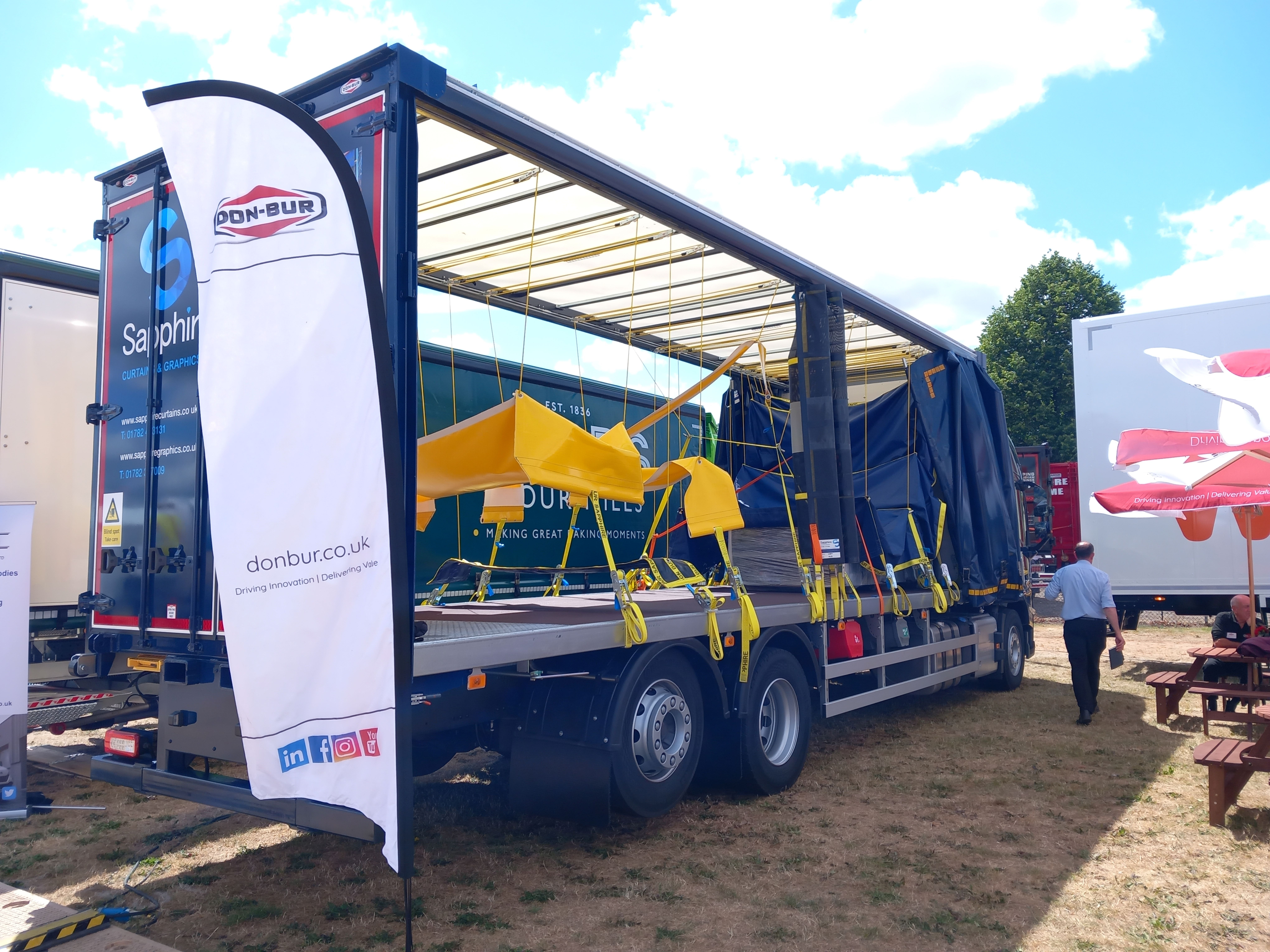
Load restraints from Don-Bur
SDC Trailers Ltd, the biggest trailer manufacturer in Britain and Ireland, showcased a curtain-sided double deck with a wraparound rear. The semi-trailer, built on BPW running gear, has a 3/4 deck and a maximum heigh of 4,880 millimetres, carrying up to 46 pallets. Currently the company is producing 110 trailer chassis per week at its Toomebridge facility in Northern Ireland and 70 curtain-siders per week at its Mansfield location. In Toomebridge, SDC recently invested £4m in new shot blasters for preparing the chassis.
Another major trailer manufacturer which covers the British and Irish markets is Dennison Trailers Ltd, which showcased a range of skeletals and platform trailers at Stoneleigh. It also presented a double-deck curtain-sider, the product of five years of investment to diversify production at its facility in Lancaster. Around £6m has been spent to create a dedicated production area for curtain-siders; Dennison had made these before, but only in small volumes. The company can now produce up to fifteen curtain-siders per week. In total, Dennison makes fifty trailers a week at its factories in England and Ireland.
Refrigerated vehicles
The production of refrigerated trailers tends to be the preserve of more specialised manufacturers. In Britain, one of the largest reefer builders is Gray & Adams Ltd of Fraserburgh, which showcased a bespoke double-deck trailer built for James Hall & Co, which serves as the primary wholesaler to retailer Spar. It boasts a fixed deck and a Dhollandia tail-lift serving both decks. It is a multi-temperature box cooled by a Carrier refrigeration unit, a hybrid system with an Addvolt battery system which can operate for up to eight hours before needing to be plugged in to recharge. The refrigerated body sits very low on the chassis and Gigant running gear, with a ground clearance of just 400 millimetres. A spokesman told T&BB that retailers are increasingly moving towards double-deck trailers for temperature-controlled transportation. Overall, Gray & Adams currently produces between 3,500 and 4,000 trailers and bodies every year.
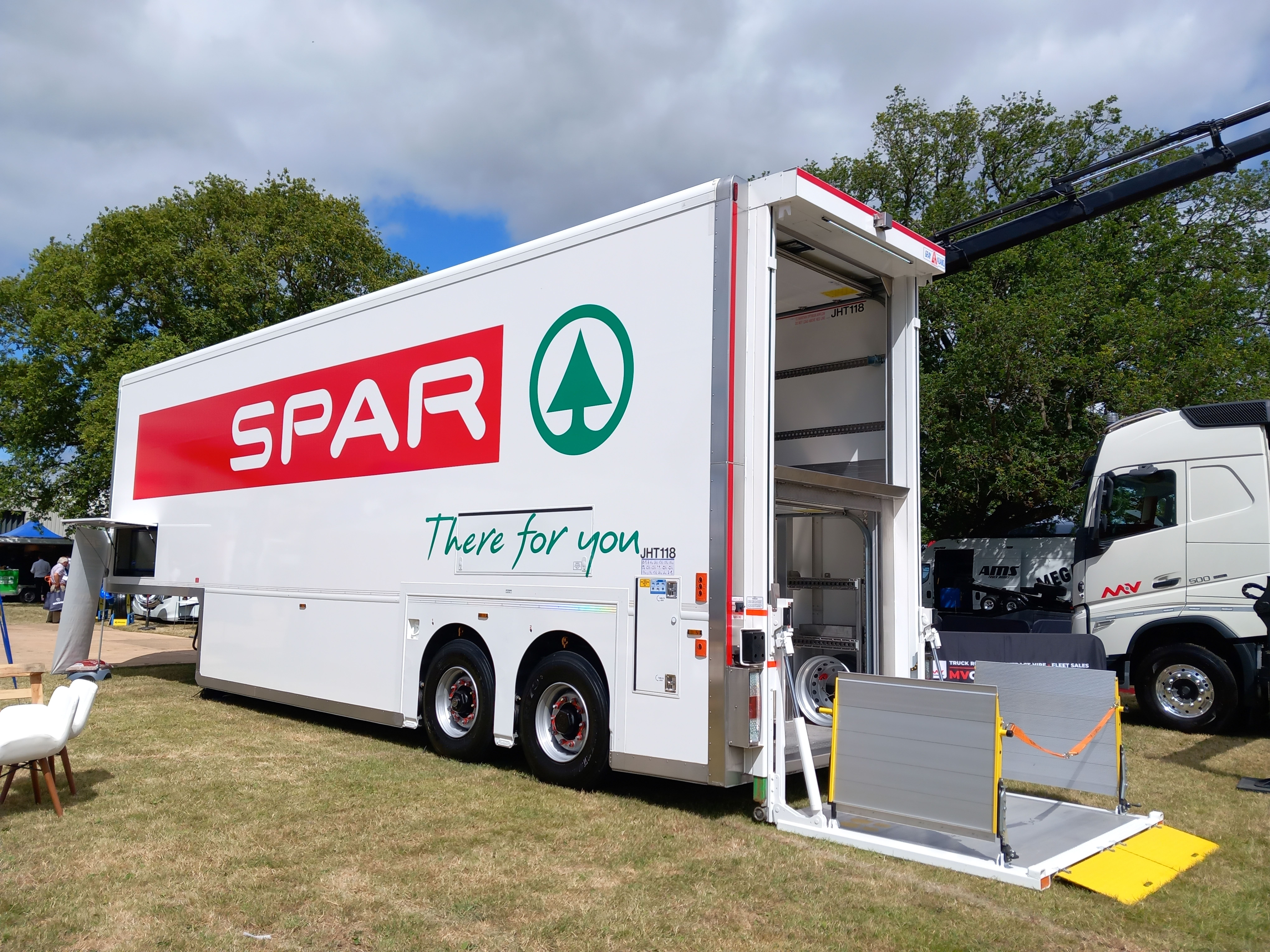
Double-deck refrigerated trailer from Gray & Adams
Lawrence David Ltd of Peterborough, one of Britain’s largest trailer manufacturers in terms of volume, used the show to promote a new venture for the company, refrigerated bodies. Though it has worked on home delivery vehicles for supermarket chain Sainsbury’s in the past, the eight-and-a-half-metre refrigerated truck presented at Stoneleigh, with multi-temperature capability and an internal bulkhead, is a first for the company, which typically produces box and curtain-sided bodies in large numbers.
The truck was commissioned by close customer Dawsongroup, who requested a Carrier fridge. In developing the body, Lawrence David benefited from the capabilities of its parent company, Wielton, which supplied the foam-composite panels for the insulated body. Otherwise, Lawrence David continues to produce an average of 4,500 to 5,000 trailers and truck bodies per year.
Paneltex Ltd of Hull established its reputation on the production of insulated body panels when it was founded in 1991. The largest vehicle by far on its stand was its refrigerated double-deck trailer, measuring 14.5 metres in length and 4.98 metres high. The tri-axle, step-frame trailer was installed with BPW running gear. The semi-trailer was built for Ocado and was fitted with an electric refrigeration unit made by Sunswap. The chassis is produced by subsidiary Martrans Trailers Ltd at its Manchester facility – a company acquired by Paneltex nearly fifteen years ago.
Though the double-deck trailer dwarfed the other vehicles on the Paneltex stand, the company’s main innovation was to be found in one of the 3.5-tonne refrigerated vans. The company used a Mercedes ‘Sprinter’ van to showcase a new smooth-lined insulated conversion kit. Normally, a Paneltex conversion would involve the installation of resin-coated insulated panelling in the cargo space of the van, but this can make maintenance more difficult. For example, parts of the vehicle such as the electronics are less accessible, requiring the operator to remove the panelling to carry out repairs. The insulation kit shown by Paneltex is designed to be easily removable, making vehicle maintenance far easier.
Paneltex produces around 65 vehicles every week. These include van conversions, rigid truck bodies, and semi-trailers. The supermarket home delivery market is its core business. Its panels are in demand with other manufacturers; a spokesman told T&BB that over four hundred conversion kits were supplied to Canada last year.
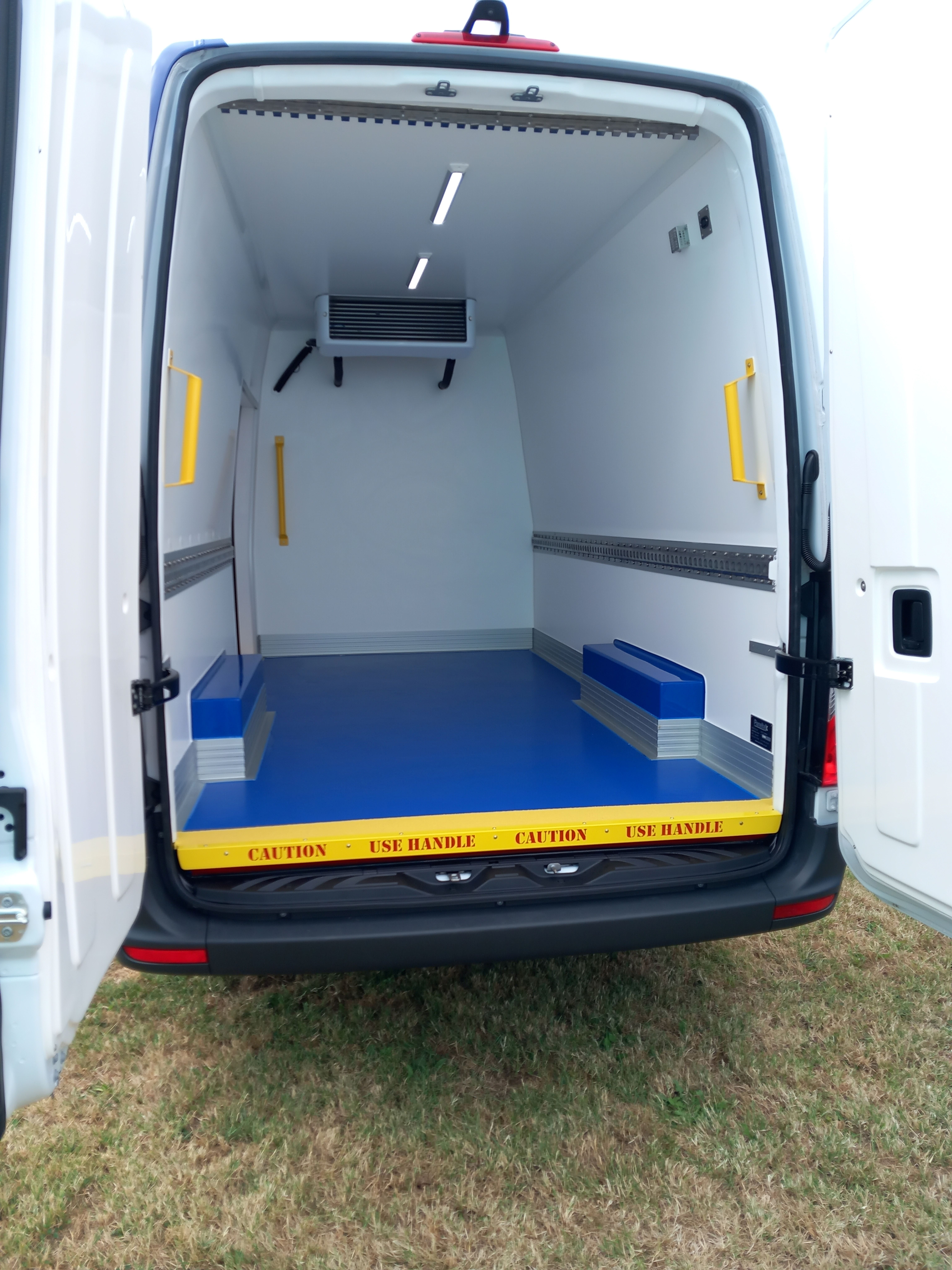
Paneltex's removable conversion kit
Tipper manufacturers
Perhaps the leading manufacturer of tipping trailers in Britain is Fruehauf Ltd, which is enjoying a new lease of life after being rescued from administration in 2021 by Scottish firm MV Commercial. The company now employs 160 people at the Grantham facility, producing fifteen tippers every week. Sales executive Daniel Colgan told T&BB that £14m has been invested in the facility, bringing it up to date with new equipment, a new roof, solar panels, and a welding robot introduced just last month.
Fruehauf’s tipping trailers are hardy units built on Swedish steel chassis and made for transporting bulk loads such as aggregates. At Stoneleigh, the company presented a prototype trailer with aluminium landing legs that is around 150 kilograms lighter altogether than its standard counterparts.
The newest name in British tipper manufacturing is Colson Trailers Ltd of Heanor, established in 2021 by waste collection specialist Colson Transport. It has quickly grown into a solid producer of lightweight tippers, such as its ‘Agglite’ line made of ‘Hardox 500’ steel, introduced last year. The company invariably uses SAF running gear. It produced around a hundred units last year.
Marvtech Ltd displayed several truck-mounted hotboxes and tippers, including a new ‘e-hotbox’ which dispenses with gas altogether. This 7.5-ton body is powered by a generator that draws 7hp in energy from the truck engine, thus eliminating the need for an LPG burner. The company is promoting the e-hotbox not only as a “greener” alternative to its conventional hotboxes, but also as a safer and more economical option. There is no need to load and store LPG on the vehicle and therefore no risk of injury from manual handling of LPG bottles. The company estimates that an operator could save over £7,000 per year by switching from LPG to the e-hotbox.
Marvtech produced its first electric hotbox last year, making a total of twenty for a single customer who is now running them on the road. Company spokesmen told T&BB that the e-hotbox is not yet a suitable option for a battery electric truck, as the power draw requirements of the generator could severely impact the vehicle range. The company continues to make improvements to the system: the body showcased at Stoneleigh represented the third “revision” made to the original design.
Based in Hapton in the northwest of England, Marvtech produces a minimum of 120 hotboxes every year, which represent the vast majority of its total output. However, the company is capable of producing more bespoke bodies and it is looking to branch out into other segments. For example, it displayed a skiploader truck with a body supplied by Spanish manufacturer Cayvol Grup which was fitted to the chassis by Marvtech’s sister company, CPN Truck Services Ltd. Marvtech celebrated its 25th anniversary last year.
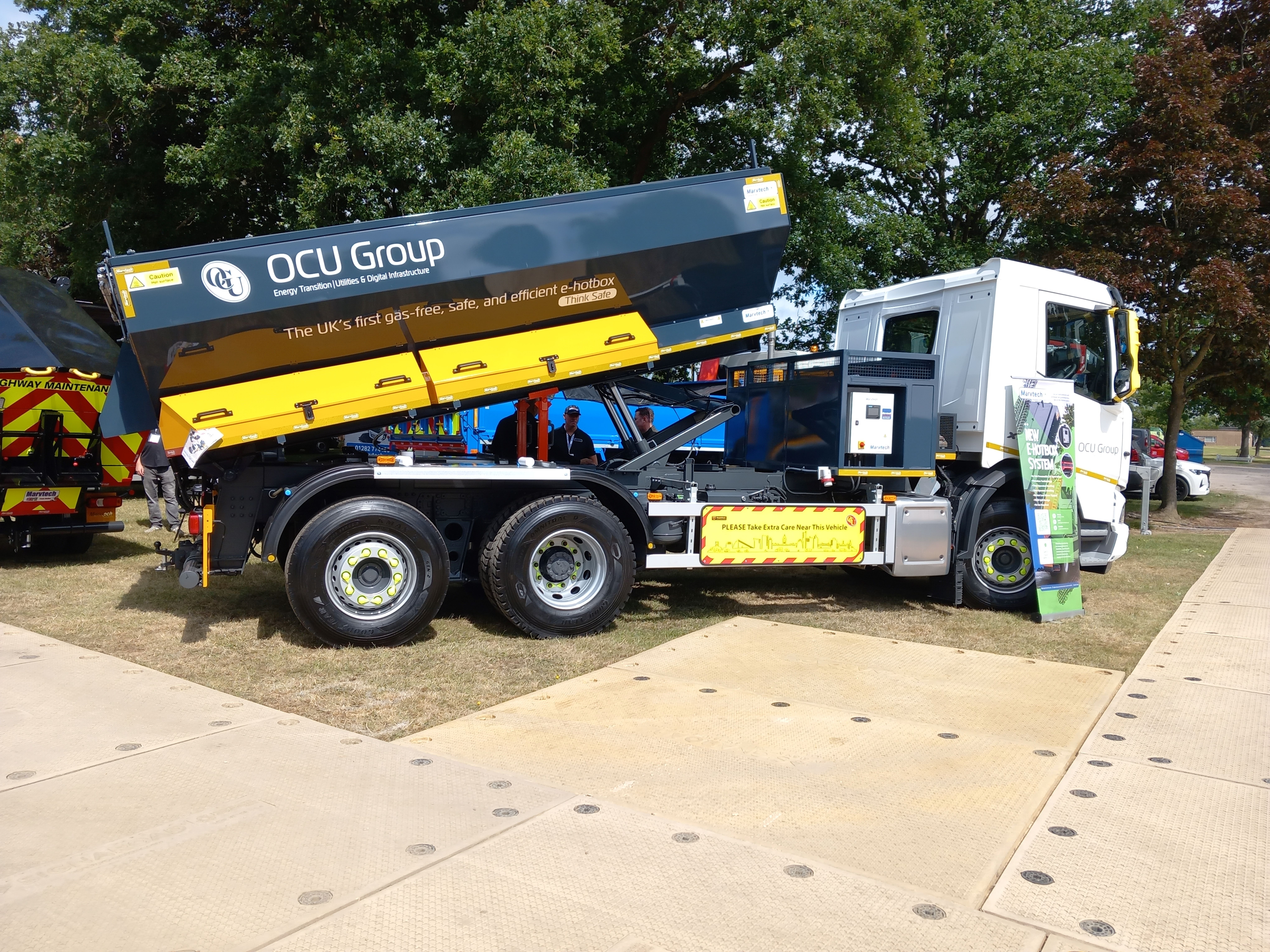
Marvtech's e-hotbox
L Townend Ltd of Holmfirth presented its lightweight ‘Hardox 450’ steel tippers, including its tridem-axle rigid on six wheels which is one of its most popular models. The 12.6-tonne vehicle is designed to carry aggregates. The company provides bodies between 3.5 and 35 tonnes, with the heavier weight models featuring an internal “double skin” for greater protection. Over one hundred tippers were produced by Townend last year.
German company Kässbohrer showcased a new ‘Hardox’ steel tipper trailer, made specifically for the British market. It was a three-axle unit with a longer wheelbase than preceding models, measuring 6,190 millimetres. Also on show was a tipping silo with a light tare weight of 6,000 kilograms and a fuel tanker designed with British customers in mind, with a 7,750mm wheelbase intended for narrow roads. The company produces a range of different trailer types, but it claims to be the market leader in low loaders, selling 165 units last year. On average, Kässbohrer sells over two hundred trailers every year into the British market.
Tanker manufacturers
The show’s tanker range was dominated by foreign makes. Representing domestic manufacturing, Crossland Tankers presented four types of tanker for the transportation of chemicals, liquids, and foodstuffs. One of these, a tandem twin-steer trailer for agricultural applications, made its debut at Stoneleigh. Conor Quinn, engineering development manager for Crossland, told T&BB that the trailer is designed to “replace rigids in milk transportation”, providing an extra five tonnes of payload compared to a rigid equivalent. Quinn claimed that, with its tandem steer axles, the tanker trailer is just as manoeuvrable as a rigid. Overall, Crossland produced around 250 tankers last year.
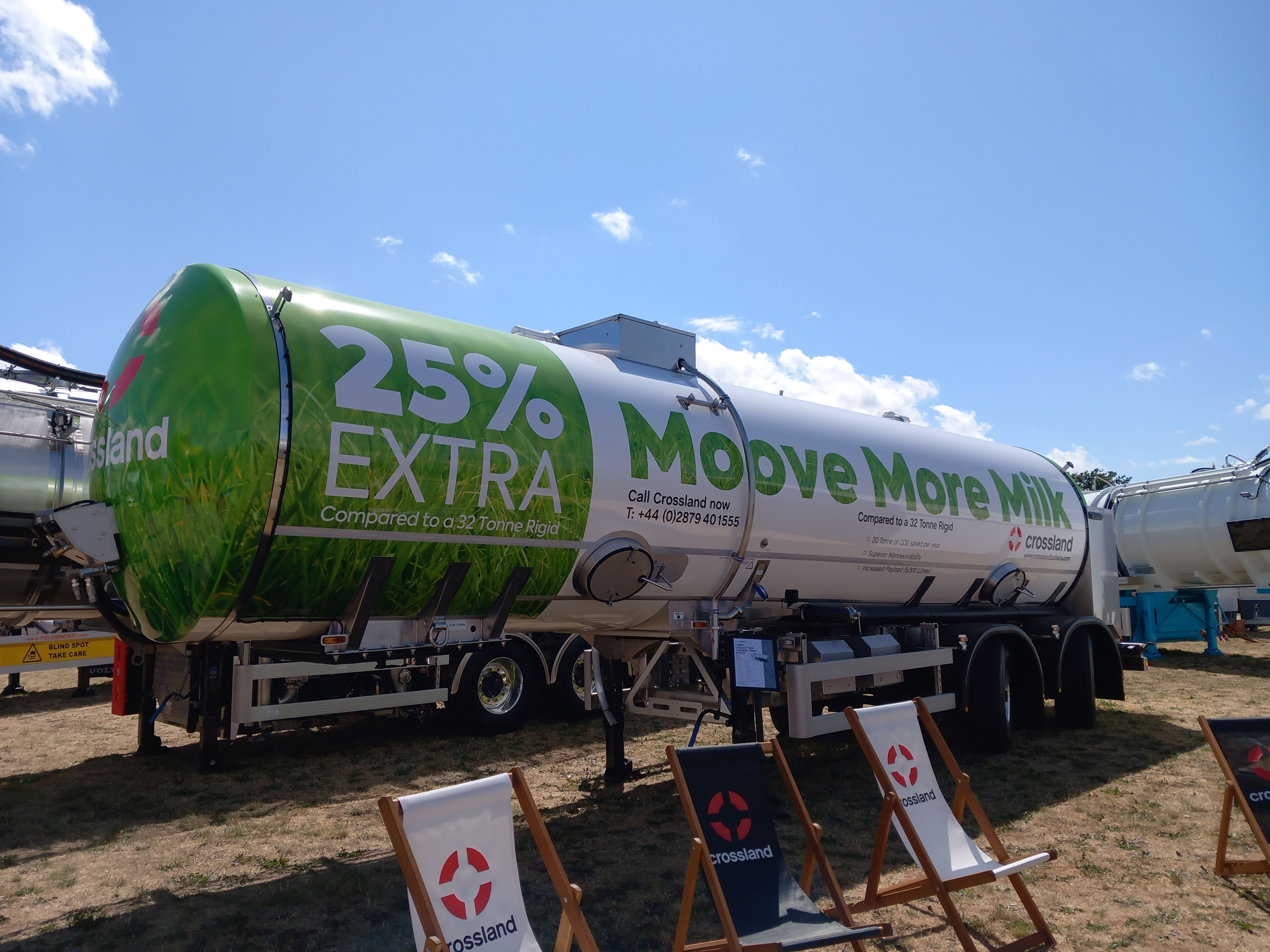
Milk tanker from Crossland
Represented by Just Tankers, Magyar, one of the biggest tanker manufacturers in Europe, had five products on show at Stoneleigh. A salesman told T&BB that Just Tankers buys tankers directly from Magyar and can supply a new one to British customers with a lead time of just three months. Magyar produces around 1,100 tankers per year; 150 units were sold in Britain last year.
Feldbinder Spezialfahrzeugwerke GmbH produces tankers for the British market from two German plants, one in Hamburg and one in Berlin. The manufacturer has typically supplied between 220 and 240 tankers to the market over the last two decades. In the past, tanker production had also taken place at the former Metalair site in Sutton Bridge, but since 2011, this location has concentrated solely on aftersales.
The company used the show to present a new tanker trailer for cement transportation. A salesman told T&BB that a lot of work was put into the new trailer in order to reduce the weight and increase its payload. Feldbinder successfully reduced its overall weight by half a ton, and it also shortened the vehicle length in order to add more height. The weight saving was achieved with the help of lightweight running gear from SAF. The trailer shown at Stoneleigh was a prototype build made for a customer; several more are now on order.
One more foreign supplier of tankers is Turkish builder Nursan Trailer, which produces steel and aluminium tankers for the British market. The company began exporting its products to the market around nine years ago; today, it has approximately one hundred trailers on the road in Britain.
Other domestic manufacturers
Among the smaller manufacturers, Titan is known for its large moving floor trailers, such as model shown at Stoneleigh with its 27.5-ton payload. A Canadian company, Titan builds its trailers for the British and European markets at a Teesside facility opened in 2009. Cliff Holdsworth, Titan’s UK sales and service manager, told T&BB that the trailers built in England follow a very different specification to those made in Canada, which are allowed a greater number of axles. Two to three trailers are made by Titan in England every week.
Another small-size builder of truck bodies is Truckcraft Bodies Ltd, founded in 2003 and based in Dukinfield in Greater Manchester. Versatility is the name of the game for a company like Truckcraft, which can install many kinds of body on every light- and medium-duty chassis available on the market. Body types include drop sides, Luton vans, flatbeds, and refrigerated bodies, though the company mainly produces box bodies (around 60 per year) and curtain-sided bodies (around 40 per year). The company has a close relationship with French corporation Renault, producing “off-the-shelf” Luton bodies for the Renault ‘Master’ range.
On the larger end of box van production is Alloy Bodies Ltd, which makes between 1,100 and 1,200 truck and van bodies per year in Manchester. The company used the show to promote a Ford ‘Transit’ box body developed for the Ford network. With a payload of 1,180 kilograms, Alloy Bodies is marketing the body as a lighter weight alternative to a typical Luton van (payload: 800-1,000kg). It is a fully-bonded box van body with “Ecofont” panelling supplied by French company Polyfont. Inside the body, Alloy Bodies fitted rails and a slide-out shelf made from galvanised steel. Besides the Ford truck, the company also presented an 18-tonne Mercedes ‘Actros’ with aerodynamic box body and a Dhollandia rear tail-lift.
Other foreign makes
Among the licensed distributors of foreign makes, Newton Trailers stands out as one of the most important in Britain today, selling products made in the Low Countries in large quantities. At Stoneleigh, it showcased a new tipping trailer from Belgian firm STAS, featuring Michelin tyres and a tyre pressure monitoring system as standard. These are made at a new factory built in Medías, Romania. Alongside the STAS tipper, Newton promoted a Fliegl trailer for transporting asphalt and a moving floor trailer for agricultural applications made by Knapen. According to Newton, more than 200 STAS trailers are sold into the British market on average every year; around 150 Knapen trailers and 40 Fliegl trailers are sold yearly.
Benalu SA of Liévin, France presented three products that prove the breadth of its portfolio. The first, a Maisonneuve product, was a stainless-steel tanker for bulk waste transport that sells in the hundreds in the British market. A tipper, produced by Benalu itself, is designed for the transport of bulk solids. Olivier Broye, export area sales director for Benalu, told T&BB that the aluminium body is the lightest on the market and sits very low on its gooseneck chassis frame. The example shown at Stoneleigh is designed for British three-axle rigids, with a built-in weighing system and a Dawbarn tarpaulin cover sheet. Around thirty of these trailers are sold by Benalu into the market every year.
Finally, Benalu presented a moving floor trailer from its latest acquisition, Legras. This steel-bodied trailer for transporting biomass sits on an aluminium chassis and is designed for the 6x2 tractor segment. The body has a domed roof, 10mm floor planks made to Legras’ specification, and double-hinged rear doors that open 270 degrees. Around two hundred of these are sold in Britain every year.
Foreign manufacturers often squeeze themselves into an export market by offering a unique product that cannot be matched by domestic producers. One such example at Stoneleigh was Hammar Maskin AB, which produces truck-mounted side loaders for container handling in Sweden. The company claims to hold the record in the heaviest lift by a side loader: sixty tonnes, according to the Guinness World Records. Hammar exports its side-loading equipment all over the world; in far-flung places such as New Zealand, Malaysia, and the USA, it runs knock-down assembly operations. It has been present in Britain for fifteen years and has around twenty side loaders on the road.



